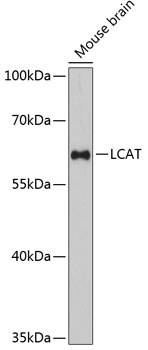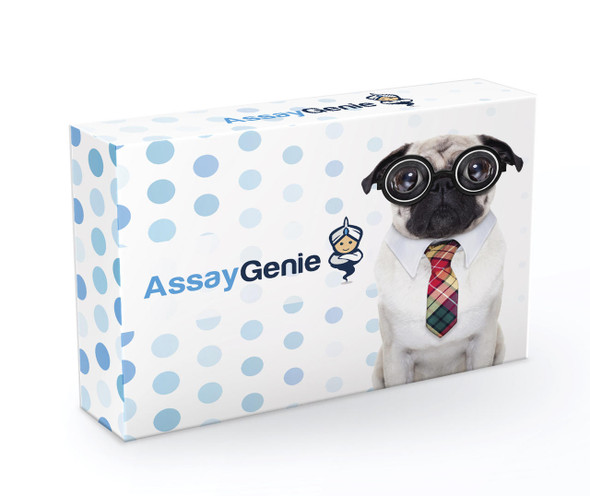Anti-LCAT Antibody (CAB11741)
- SKU:
- CAB11741
- Product type:
- Antibody
- Reactivity:
- Human
- Mouse
- Host Species:
- Rabbit
- Isotype:
- IgG
- Antibody Type:
- Polyclonal Antibody
- Research Area:
- Metabolism
Frequently bought together:
Description
| Antibody Name: | Anti-LCAT Antibody |
| Antibody SKU: | CAB11741 |
| Antibody Size: | 20uL, 50uL, 100uL |
| Application: | WB IHC |
| Reactivity: | Human, Mouse |
| Host Species: | Rabbit |
| Immunogen: | Recombinant fusion protein containing a sequence corresponding to amino acids 25-440 of human LCAT (NP_000220.1). |
| Application: | WB IHC |
| Recommended Dilution: | WB 1:500 - 1:2000 IHC 1:50 - 1:100 |
| Reactivity: | Human, Mouse |
| Positive Samples: | Mouse brain |
| Immunogen: | Recombinant fusion protein containing a sequence corresponding to amino acids 25-440 of human LCAT (NP_000220.1). |
| Purification Method: | Affinity purification |
| Storage Buffer: | Store at -20°C. Avoid freeze / thaw cycles. Buffer: PBS with 0.02% sodium azide, 50% glycerol, pH7.3. |
| Isotype: | IgG |
| Sequence: | FWLL NVLF PPHT TPKA ELSN HTRP VILV PGCL GNQL EAKL DKPD VVNW MCYR KTED FFTI WLDL NMFL PLGV DCWI DNTR VVYN RSSG LVSN APGV QIRV PGFG KTYS VEYL DSSK LAGY LHTL VQNL VNNG YVRD ETVR AAPY DWRL EPGQ QEEY YRKL AGLV EEMH AAYG KPVF LIGH SLGC LHLL YFLL RQPQ AWKD RFID GFIS LGAP WGGS IKPM LVLA SGDN QGIP IMSS IKLK EEQR ITTT SPWM FPSR MAWP EDHV FIST PSFN YTGR DFQR FFAD LHFE EGWY MWLQ SRDL LAGL PAPG VEVY CLYG VGLP TPRT YIYD HGFP YTDP VGVL YEDG DDTV ATRS TELC GLWQ GRQP QPVH LLPL HGIQ HLNM VFSN LTLE HINA ILLG AYRQ GPPA SPTA SPEP PPPE |
| Gene ID: | 3931 |
| Uniprot: | P04180 |
| Cellular Location: | Secreted |
| Calculated MW: | 49kDa |
| Observed MW: | 60kDa |
| Synonyms: | LCAT |
| Background: | This gene encodes the extracellular cholesterol esterifying enzyme, lecithin-cholesterol acyltransferase. The esterification of cholesterol is required for cholesterol transport. Mutations in this gene have been found to cause fish-eye disease as well as LCAT deficiency. |
| UniProt Protein Function: | LCAT: Central enzyme in the extracellular metabolism of plasma lipoproteins. Synthesized mainly in the liver and secreted into plasma where it converts cholesterol and phosphatidylcholines (lecithins) to cholesteryl esters and lysophosphatidylcholines on the surface of high and low density lipoproteins (HDLs and LDLs). The cholesterol ester is then transported back to the liver. Has a preference for plasma 16:0-18:2 or 18:O-18:2 phosphatidylcholines. Also produced in the brain by primary astrocytes, and esterifies free cholesterol on nascent APOE-containing lipoproteins secreted from glia and influences cerebral spinal fluid (CSF) APOE- and APOA1 levels. Together with APOE and the cholesterol transporter ABCA1, plays a key role in the maturation of glial-derived, nascent lipoproteins. Required for remodeling high-density lipoprotein particles into their spherical forms. Defects in LCAT are the cause of lecithin-cholesterol acyltransferase deficiency (LCATD); also called Norum disease. LCATD is a disorder of lipoprotein metabolism characterized by inadequate esterification of plasmatic cholesterol. Two clinical forms are recognized: familial LCAT deficiency and fish-eye disease. Familial LCAT deficiency is associated with a complete absence of alpha and beta LCAT activities and results in esterification anomalies involving both HDL (alpha-LCAT activity) and LDL (beta-LCAT activity). It causes a typical triad of diffuse corneal opacities, target cell hemolytic anemia, and proteinuria with renal failure. Defects in LCAT are a cause of fish-eye disease (FED); also known as dyslipoproteinemic corneal dystrophy or alpha-LCAT deficiency. FED is due to a partial LCAT deficiency that affects only alpha-LCAT activity. It is characterized by low plasma HDL and corneal opacities due to accumulation of cholesterol deposits in the cornea ('fish-eye'). Belongs to the AB hydrolase superfamily. Lipase family. |
| UniProt Protein Details: | Protein type:Secreted; Secreted, signal peptide; Lipid Metabolism - glycerophospholipid; EC 2.3.1.43; Transferase Chromosomal Location of Human Ortholog: 16q22.1 Cellular Component: extracellular region; extracellular space Molecular Function:apolipoprotein A-I binding; phosphatidylcholine-sterol O-acyltransferase activity; protein binding Biological Process: cholesterol homeostasis; cholesterol metabolic process; cholesterol transport; lipoprotein metabolic process; phosphatidylcholine biosynthetic process; phosphatidylcholine metabolic process; phospholipid metabolic process; reverse cholesterol transport Disease: Fish-eye Disease; Lecithin:cholesterol Acyltransferase Deficiency |
| NCBI Summary: | This gene encodes the extracellular cholesterol esterifying enzyme, lecithin-cholesterol acyltransferase. The esterification of cholesterol is required for cholesterol transport. Mutations in this gene have been found to cause fish-eye disease as well as LCAT deficiency. [provided by RefSeq, Jul 2008] |
| UniProt Code: | P04180 |
| NCBI GenInfo Identifier: | 125993 |
| NCBI Gene ID: | 3931 |
| NCBI Accession: | P04180.1 |
| UniProt Secondary Accession: | P04180,Q53XQ3, |
| UniProt Related Accession: | P04180 |
| Molecular Weight: | 49,578 Da |
| NCBI Full Name: | Phosphatidylcholine-sterol acyltransferase |
| NCBI Synonym Full Names: | lecithin-cholesterol acyltransferase |
| NCBI Official Symbol: | LCAT |
| NCBI Protein Information: | phosphatidylcholine-sterol acyltransferase |
| UniProt Protein Name: | Phosphatidylcholine-sterol acyltransferase |
| UniProt Synonym Protein Names: | Lecithin-cholesterol acyltransferase; Phospholipid-cholesterol acyltransferase |
| UniProt Gene Name: | LCAT |
| UniProt Entry Name: | LCAT_HUMAN |








